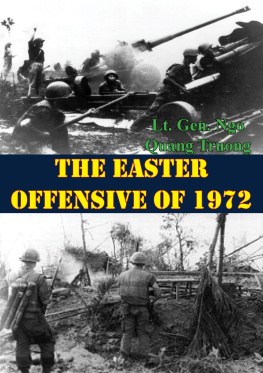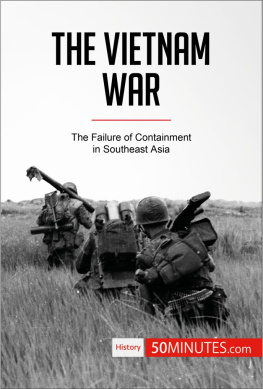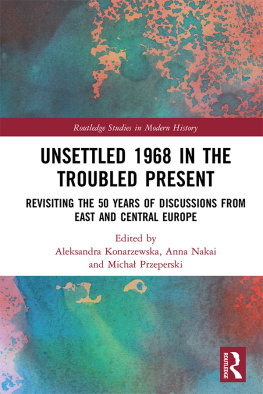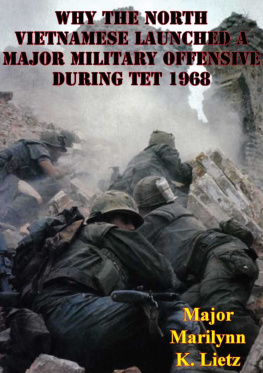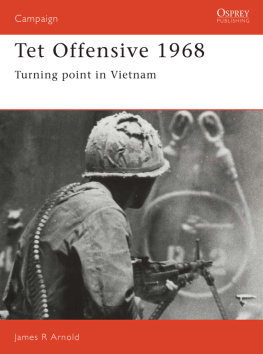CASS SERIES: STUDIES IN INTELLIGENCE
(Series Editors: Christopher Andrew and Michael I. Handel)
TET 1968 Understanding the Surprise
Also in this series
Codebreaker in the Far East
by Alan Stripp
War, Strategy and Intelligence
by Michael I. Handel
Controlling Intelligence
edited by Glenn P. Hastedt
Security and Intelligence in a Changing World: New Perspectives for the 1990s
edited by A. Stuart Farson, David Stafford and Wesley K. Wark
Spy Fiction, Spy Films and Real Intelligence
edited by Wesley K. Wark
From Information to Intrigue: Studies in Secret Service Based on the Swedish Experience 193945
by C.G. McKay
Dieppe Revisited: A Documentary Investigation
by John Campbell
The Australian Security Intelligence Organization: An Unofficial History
by Frank Cain
Intelligence and Strategy in the Second World War
edited by Michael I. Handel
Policing Politics: Security Intelligence and the Liberal Democratic State
by Peter Gill
Intelligence, Defence and Diplomacy: British Policy in the Post-war World
edited by Richard J. Aldrich and Michael F. Hopkins
Intelligence and Imperial Defence; British Intelligence and the Defence of the Indian Empire, 19041924
by Richard J. Popplewell
TET 1968
Understanding the Surprise
Ronnie E. Ford
Captain, US Army
With Forewords by
General William C. Westmoreland
and George W. Allen
First published in 1995 in Great Britain by
FRANK CASS & CO. LTD
2 Park Square, Milton Park,
Abingdon, Oxon, OX14 4RN
and in the United States of America by
FRANK CASS
270 Madison Ave,
New York NY 10016
Transferred to Digital Printing 2005
Copyright 1995 R. E. Ford
British Library Cataloguing in Publication Data
Ford, Ronnie E.
Tet 1968: Understanding the Surprise.
(Studies in Intelligence Series)
I. Title II. Series
959.70434
ISBN 0-7146-4587-7 (cloth)
ISBN 0-7146-4166-9 (paper)
Library of Congress Cataloging in Publication Data
Ford. Ronnie E., 1961-
Tet 1968: understanding the surprise/Ronnie E. Ford.
p. cm. (CASS seriesstudies in intelligence)
Includes bibliographical references and index.
ISBN 0-7146-4587-7 (cloth) 0-7146-4166-9 (paper)
1. Tet Offensive, 1968. 2. Vietnamese Conflict, 19611975
Military intelligenceUnited States. I. Title. II. Series.
DS557.8.T4F67 1995
94-39310
959.70438dc20
CIP
The views expressed in this book are those of the author and do not reflect the official policy or position of the US Government or Department of Defense.
All rights reserved. No part of this publication may be reproduced in any form or by any means, electronic, mechanical, photocopying, recording or otherwise, without the prior permission of Frank Cass and Company Limited.
For Betsy
Contents
Prologue
Doc Lap, the Vietnamese legacy of independence, can be traced back to the dawn of their history around 500 BC, when several clan tribes, called the Viets, living in China South of the Yangtze River came under strong assimilation pressure from the Chinese. The Nam (South) Viets, rather than yield as did many of their tribal Viet neighbors, began a great southward exodus and chose as their new home the delta of the Red River. Thus an ethnically identifiable group was created whose reasonably pure lineage is traceable to the present day, a fact of which all Vietnamese, and Chinese for that matter, are aware.
Douglas Pike
1966
Foreword
Captain Ron Fords research has revealed for the first time Hanois intent and objectives for the 1968 Tet Offensive. Combining translated primary source Communist Vietnamese interpretations of the event with existing Western accounts, he has analyzed and reconstructed an historical event that has been, until now, a subject of mixed interpretation and serious debate.
Now the actual significance of the Communists TCK/TKN battle plan (the General Offensive and General Uprising), the 1967 Border Battles of Loc Ninh, Song Be and Dak To and the meaning of the confrontation at Khe Sanh have finally come to light.
Captain Ford tracks and documents from initial conception to actual initiation the Vietnamese strategy of combining the concepts of the Decisive Victory against an enemy who could not be defeated militarily. Tet 1968: Understanding the Surprise reveals that Hanoi identified the year 1968 as their opportunity to escalate the war in South Vietnam with little risk to North Vietnam itself because the Democratic Party of the United States, preoccupied with re-election, would have their hands tied due to the worldwide and internal domestic opposition to the war.
This work is essential reading for both scholars of the Vietnam War and American Vietnam veterans who wish to understand the enemy their country asked them to fight.
W.C. Westmoreland
General, US Army (Retired)
October, 1993
Foreword
The dramatic events which ushered in the 1968 Lunar New Year in Vietnam mark a low point in the record of American intelligence. Washingtons strategists and policy-makers had not been alerted to the prospect that the enemys impending spring offensive would decide the outcome of the war; that its unconventional nature would scuttle the Johnson administrations efforts to create an image of progress and success in the conflict; and that the rug would be pulled from under its confidence that victory could be won in Vietnam before the approaching presidential elections.
American intelligence not only failed to warn that the wars turning point was imminent but had, in fact, reinforced assurances from the US mission in Saigon that US policies were on the right track, and that the war had gone well during the preceding year. Indeed, the intelligence community had estimated in November 1967 that, although the Vietnamese Communists probably could sustain their struggle through the coming year, their position had already been seriously weakened. That estimate contained no hint of the unprecedented scale and dramatic impact of the offensive the Viet Cong and North Vietnamese were about to unleash throughout South Vietnam; the policy-makers were thus blind-sided by the strength and boldness of the enemys attacks into the cities, and overwhelmed by the ensuing media outcry.
The reasons for Washingtons over-sanguine view of the war on the eve of the disastrous Tet Offensive, and the contribution of the intelligence community to that view, deserve thoughtful study if similarly disastrous collapses of US policy are to be avoided. Don Oberdorfers Tet stands as a solid overview of the issue, but he wrote without access to the mass of related US intelligence reports and assessments which have been declassified in the past two decades, and before the more recent availability of important North Vietnamese historical accounts of the war. Subsequent studies of Tet 1968 have benefited from access to the former, but the latter hitherto have remained unexplored.
Captain Ronnie Ford thus breaks important new ground with this study by exploiting the available historical materials of both sides. He is the first to utilize a number of important North Vietnamese historical papers, some of which he arranged to be translated by the Defense Department. A young and energetic Army intelligence officer, he has also mined other primary documentary collections, and interviewed many of the key players in the intelligence wars and debates of the period. It was my privilege and pleasure to serve among his mentors during his labors on this book.



